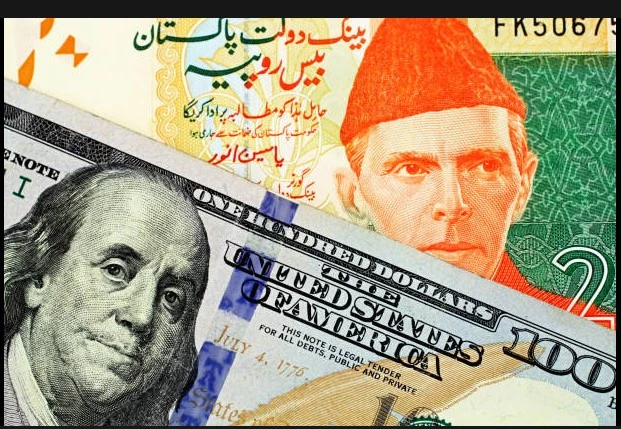Pakistani rupee knocks out US dollar in interbank trading

Stay tuned with 24 News HD Android App

The Pakistani rupee buoyed by the government’s crackdown on the black marketers knocked out the US dollar in the interbank business on Thursday, reported 24NewsHD TV channel.
According to the State Bank of Pakistan, the local currency soared by a massive Rs2.04 against the greenback and was closed at Rs304.94.
Interbank closing #ExchangeRate for todayhttps://t.co/3lmMOguoYQ#SBPExchangeRate pic.twitter.com/bgjK6DDbGu
— SBP (@StateBank_Pak) September 7, 2023
On Wednesday, the Pakistani rupee had witnessed a slight recovery against the US dollar to settle at Rs306.98 in the interbank market. At close, the rupee was up 12 paisas or 0.04%.
Interbank closing #ExchangeRate for todayhttps://t.co/SytjyekglO#SBPExchangeRate pic.twitter.com/Nxvgd9SQ05
— SBP (@StateBank_Pak) September 6, 2023
Rupee climbs up in open market
The situation was not much different in the open market where the rupee climbed up by five rupees against the US dollar on Thursday, bringing the greenback down to Rs307 from Rs312.
Exchange Companies Association General Secretary Zafar Piracha said the crackdown bringing in new life in the money market. “The rupee value can be appreciated further by improving the policy as buyers are not turning up now,” he added.
The euro was also dropped by three rupees to Rs332, British pound down by nine rupees to Rs388, Saudi Riyal decreased by Rs1.50 to Rs8`.80 and Emirati dirham unchanged at Rs86.80.
The turnaround was triggered by a severe crackdown by the authorities against those involved in the currency black market.
Experts were of the view that the customers who have been holding dollars are now selling it in the market. However, the real issue is improvement in dollar inflows, which is a long-term solution, they added.
Administrative measures can control exchange rate in the open market, but controlling it in the interbank would require dollar inflows,” the experts elaborated.
In a related development, the State Bank of Pakistan (SBP) has decided to introduce structural reforms in order to bring "transparency" in the exchange companies sector. "As part of these reforms, leading banks actively engaged in foreign exchange business will establish wholly owned Exchange Companies to cater to the legitimate foreign exchange needs of general public", a press release issued by the central bank stated.
Under the reforms, various types of existing exchange companies and their franchises will be consolidated and transformed into a single category of "Exchange Companies" with a well-defined mandate.
Moreover, the minimum capital requirement for exchange companies has been increased from Rs200 million to Rs500 million.
1/2 To provide better services to general public and bring transparency & competitiveness, #SBP has introduced structural reforms in the exchange companies’ sector.https://t.co/E2gEFOehNW#SBPPressRelease pic.twitter.com/juDequA8tX
— SBP (@StateBank_Pak) September 6, 2023
Here are the Exchange Companies reforms:
• ECs-B may graduate to Exchange Companies after meeting all regulatory requirements, within three months; otherwise, their license would be cancelled.
• Franchisees of Exchange Companies may either merge or sell operations to the concerned franchiser company, within three months after meeting all regulatory requirements.
For the above purpose, the ECs-B and Franchises of Exchange Companies will submit their conversion plan and seek a no-objection certificate (NOC) from SBP within one month.
2/2 As part of these reforms, leading banks actively engaged in foreign exchange business will establish wholly-owned exchange companies. Existing Exchange Companies will be consolidated into a single category. Their minimum capital requirement has been increased to PKR 500mn.
— SBP (@StateBank_Pak) September 6, 2023
The above reforms have been introduced to provide better services to the general public and bring transparency and competitiveness in the exchange companies’ sector.
This is expected to strengthen governance, internal controls, and compliance culture in the sector, the SBP stated.
Reporter Ashraf Khan
